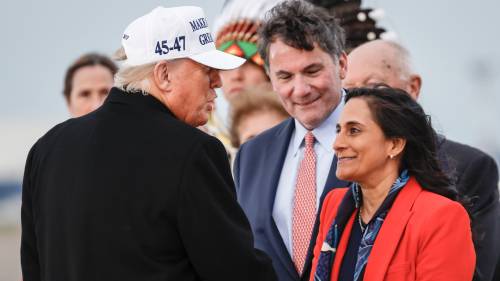The room fell silent as Canadian Defence Minister Anita Anand delivered her assessment of Iran’s nuclear ambitions last week. Standing before a panel of security experts in Ottawa, her words carried the weight of growing international concern.
“Iran’s nuclear program remains a source of grave instability in the Middle East and beyond,” Anand stated, her tone measured but unmistakably urgent. “We are calling for immediate de-escalation and a return to diplomatic channels.”
Her comments come at a particularly volatile moment. The International Atomic Energy Agency (IAEA) reported in March that Iran has accelerated uranium enrichment to near weapons-grade levels—reaching 60% purity when 90% is considered weapons-grade. This dramatic increase has shortened what experts call the “breakout time”—the period needed to produce enough fissile material for a nuclear weapon—from years to potentially weeks.
“We’re witnessing a dangerous game of brinkmanship,” explains Dr. Naomi Kikoler, director of the Simon-Skjodt Center for the Prevention of Genocide, whom I interviewed following the minister’s remarks. “Iran continues advancing its program while maintaining just enough ambiguity about weaponization to avoid triggering direct military intervention.”
This nuclear advancement unfolds against a backdrop of wider regional instability. The ongoing Israel-Hamas conflict has further complicated diplomatic efforts, with Iran backing Hamas and other non-state actors across the Middle East. Western intelligence agencies have reported increased material support flowing from Tehran to these groups since October 2023.
For Canada, the stakes are personal as well as geopolitical. The country continues seeking justice for the 55 Canadian citizens and 30 permanent residents killed when Ukraine International Airlines Flight PS752 was shot down by Iranian surface-to-air missiles in January 2020. This tragedy remains an open wound in Canadian-Iranian relations.
“Minister Anand’s comments reflect growing frustration among Western allies,” says Trita Parsi, Executive Vice President of the Quincy Institute for Responsible Statecraft. “The collapse of the JCPOA nuclear deal in 2018 removed critical verification mechanisms, and subsequent efforts to revive the agreement have stalled.”
The 2015 Joint Comprehensive Plan of Action (JCPOA) had imposed strict limits on Iran’s nuclear program in exchange for sanctions relief. When the United States withdrew from the deal under President Trump, Iran gradually abandoned its commitments, ramping up enrichment activities and restricting IAEA access to key facilities.
Walking through the Canadian Parliament’s Centre Block after the briefing, I spoke with a senior diplomatic source who requested anonymity to speak candidly. “What’s particularly concerning is Iran’s development of advanced centrifuges and accumulated know-how,” the diplomat explained. “Even if a new agreement were reached tomorrow, you can’t erase that technical knowledge.”
Economic pressures have failed to halt the program. Despite crippling sanctions that have devastated Iran’s economy—inflation has surpassed 40% according to the World Bank—the regime has prioritized nuclear advancement over economic relief. Oil exports to China provide a financial lifeline that sustains the program despite international isolation.
The human cost of this standoff falls primarily on ordinary Iranians. During my reporting from neighboring countries last year, I met dozens of Iranian expatriates who described how sanctions and international isolation have decimated middle-class livelihoods while empowering hardline elements within the regime.
“My sister can’t get her cancer medications because of banking restrictions,” explained Maryam, a former university professor now living in Turkey. “Meanwhile, the Revolutionary Guards control the black market and grow richer from the crisis.”
Minister Anand’s call for de-escalation comes as military options remain on the table for several actors. Israel has repeatedly signaled willingness to take unilateral action, while the United States maintains a significant naval presence in the Persian Gulf, including the USS Dwight D. Eisenhower carrier strike group.
“We’re approaching a decision point,” warns Michael Singh, managing director at The Washington Institute for Near East Policy. “Either diplomacy yields meaningful constraints on Iran’s program, or we face increasing risk of military confrontation in an already volatile region.”
Technical assessments vary on Iran’s actual progress toward weaponization. While uranium enrichment continues, weaponizing requires additional steps including warhead design, miniaturization, and delivery system integration. Intelligence agencies diverge on how far this work has advanced, though most agree capabilities have expanded significantly.
For Canada, navigating this crisis requires balancing multiple priorities: supporting allies, preventing nuclear proliferation, seeking accountability for Flight PS752, and avoiding further regional escalation that could threaten global security.
“Minister Anand’s statement threads that needle,” notes Roland Paris, professor of international affairs at the University of Ottawa. “It signals serious concern without closing diplomatic doors.”
As the international community watches Iran’s next moves, the stakes continue rising. What began as a regional concern has evolved into a defining international security challenge of 2024, with implications far beyond the Middle East. The question remains whether diplomacy can still prevail, or if the world faces a new nuclear crisis with unpredictable consequences.






